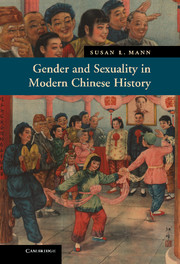Book contents
- Frontmatter
- Contents
- Figures
- Acknowledgments
- Preface: Does Sex Have a History?
- Introduction: The cloistered lady and the bare stick
- Part I Gender, Sexuality, and the State
- 1 Family and state: the separation of the sexes
- 2 Traffic in women and the problem of single men
- 3 Sexuality and gender relations in politics and law
- PART II GENDER, SEXUALITY, AND THE BODY
- Part III Gender, Sexuality, and the Other
- Permissions
- References
- Index
2 - Traffic in women and the problem of single men
from Part I - Gender, Sexuality, and the State
Published online by Cambridge University Press: 05 June 2012
- Frontmatter
- Contents
- Figures
- Acknowledgments
- Preface: Does Sex Have a History?
- Introduction: The cloistered lady and the bare stick
- Part I Gender, Sexuality, and the State
- 1 Family and state: the separation of the sexes
- 2 Traffic in women and the problem of single men
- 3 Sexuality and gender relations in politics and law
- PART II GENDER, SEXUALITY, AND THE BODY
- Part III Gender, Sexuality, and the Other
- Permissions
- References
- Index
Summary
“Come,” he said [to my daughter, his wife]. “This is not such bad business, having girls. Each one will sell for three hundred taels and we can live on that a long time, and then I can sell you for three hundred more if there are no more girls to sell.”
Ning Lao T’ai-t’ai (Pruitt 1945:168)Little Lu had to go to the railway station to pick up and escort home a young woman who was kidnapped into another province.…Girls are tricked into signing on to work on the coast, and then are sold as brides into poor mountain villages.
Woman's Federation cadre in Sichuan (Gates 1996:8)The late imperial social order anchored married men and women in stable family relationships, organized around the principle of separation of the sexes. But what happened to men or women who abandoned the family, or were forced out of the family, or were denied a family? When things fell apart, as they did in Ning Lao T’ai-t’ai's world at the end of the Qing dynasty, wives were rented, daughters were sold, and unattached men at the bottom of the social hierarchy banded together to survive. In other times of stress, such as the Taiping Rebellion in the mid-nineteenth century, parents put female infants to death so they could count on rearing a son who would carry on the patriline. Social disorder, then, was always encoded with sexual and gendered conflicts and tensions, ranging from female infanticide and suicide to rebellion and the collapse of dynasties.
Maintaining social order was the charge of the emperor, who, by wise governance, ensured that heaven, human society, and earth remained in harmonious accord. The ruler received a “mandate” from heaven to assume this weighty responsibility. Chaos in society and in the natural world (drought, flood, earthquake, or rebellion) signaled that heaven's mandate had been withdrawn. Free-floating sexuality not only threatened the social order; it also endangered the emperor's hold on the Mandate of Heaven. Some of this danger lurked close to the throne, as the early philosopher Han Fei Zi warned:
The ruler is easily beguiled by lovely women and charming boys, by all those who can fawn and play at love. They wait for the time when he is enjoying his ease, take advantage of the moment when he is sated with food and wine, and ask for anything they desire.…The ministers…ply them in the palace with gold and jewels and employ them to delude the ruler. (Burton Watson 1964:43)
- Type
- Chapter
- Information
- Gender and Sexuality in Modern Chinese History , pp. 50 - 65Publisher: Cambridge University PressPrint publication year: 2011



